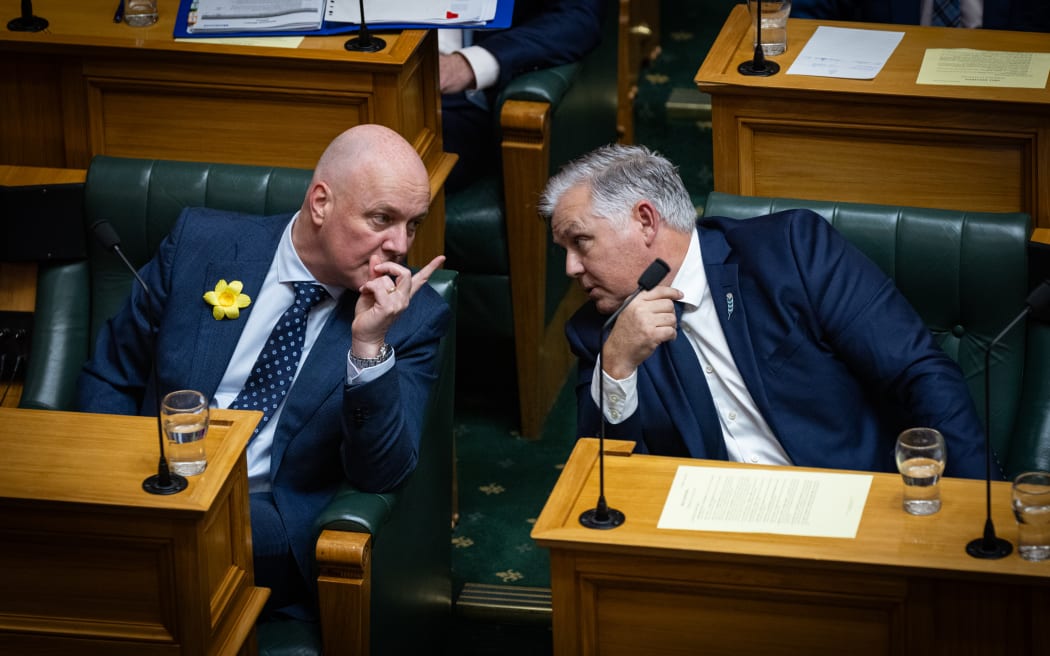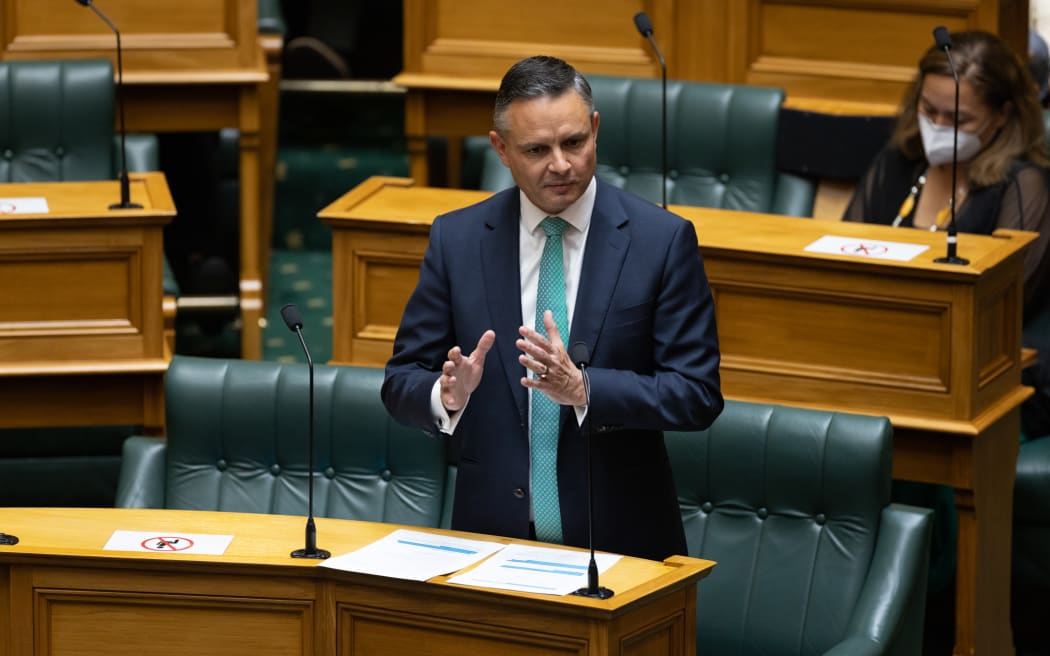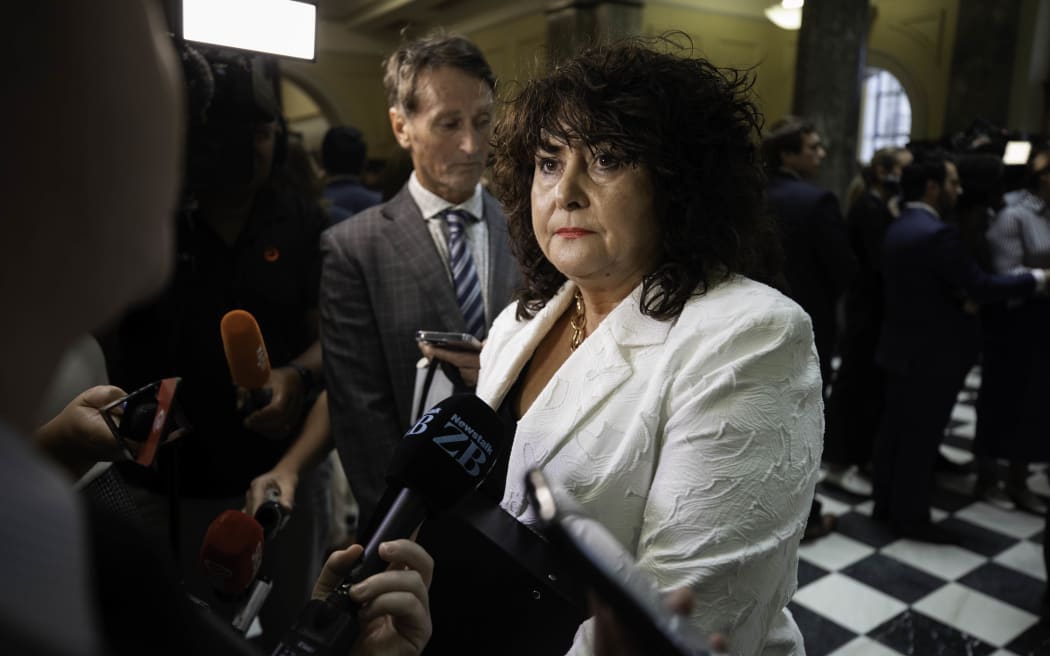I suspect opposition MPs and politics watchers sometimes observe government ministers and think - ‘well, that looks like a doddle’. From observation, the job mostly involves finding ways of avoiding questions about the role.
But a minister’s job is full of fish hooks, made worse because ministers essentially work inside a fish bowl owned by Parliament. And to strain that metaphor to its breaking point, those hooks are hard to remove if you don’t remove them quickly.
New and returning ministers have been learning (and remembering) this early on in this government.

Christopher Luxon and Mark Mitchell when they were in opposition. This week both walked back statements made to the House. Photo: VNP / Phil Smith
Misleading the House
The easiest hook to remove is one barbed with Parliament’s dislike of falsehood. The House does not take well to Ministers who mis-speak, offer alternative facts, employ terminological inexactitudes; or just plain get the facts wrong.
A minister misleading the House is considered a breach of privilege, which is very naughty indeed. However, the breach must be intentional and accusations of such intention can be avoided if a minister follows protocol and corrects mistakes ‘at the earliest opportunity’.
So three times on Wednesday alone government ministers interrupted business in the House to correct errors.
They do that by asking permission (seeking leave) to make a personal statement.
Minister for Police Mark Mitchell got his mea culpa in early. It was a good tactic to pre-empt impending questions which would have been embarrassing.
He didn’t exactly admit an error either. “I should have been clearer” was Mark Mitchell’s euphemism for admitting that either he had been wrong, or had changed his mind. It wasn’t clear which.

James Shaw caused the Prime Minister difficulties over our genocide responsibilities. Photo: ©VNP / Phil Smith
Later on, Prime Minister Christopher Luxon attempted to extricate himself from a tangle James Shaw had left him in over whether the ICJ’s opinion of a plausible risk of genocide in Gaza “would trigger New Zealand's obligations under article 1 of the [Convention on the Prevention and Punishment of the Crime of Genocide] to take action to prevent genocide before it occurs.”
When Luxon returned to try again he clarified thus: “I said that there wasn't a plausible risk. What I should have said is that the court was not required to determine whether Israel had actually breached its obligations under the genocide convention. Therefore, the court did not make any findings that Israel has actually engaged in genocidal conduct. However, the court found that there is a plausible case that Israel's conduct in Gaza may breach its obligations under the genocide convention. That will be the subject of a full and substantive hearing in the International Court of Justice.”
Yes, the corrections of errors by ministers do tend to be quite carefully worded.
The third minister to clarify an earlier answer from Question Time was Louise Upston who had mixed up a couple of totals for different benefit categories.
Losing the loose ways of opposition
Personal explanations for the correction of answers are not rare, but three in a day is – a lot.
At fault might be the tricky shift from opposition to government. The roles require a very different mindset and much more care in what is said.
Opposition MPs can (and frequently do) bluster, make wild claims, or just wing it with something that bears a passing resemblance to the facts. They can generally get away with it too because it is against the rules in the House to accuse another MP of falsehood. Doing so must be done elseways and seems to involve more trouble and less public scrutiny than anyone cares for.
But ministers are held to a higher standard.
Ministers are wise to follow the rules and correct mistakes quickly for two reasons. The first is political. Uncorrected mistakes can fester. Trying to bluster through an error can turn a quick walk-back into an ugly climb down.
But more important is the constitutional reason – Parliament is actually the boss of the government and the ministers (or in parliament-speak), the Ministers are responsible to Parliament.

Photo: RNZ / Angus Dreaver
Welcome to a new kind of responsibility Ms Costello
Ministers are responsible to Parliament for everything relating to their role as minister, but are not responsible for things related to their role in their political party.
It is not unusual in Parliament for some friction over where one role ends and another begins.
Serious debates have been had over which member of a minister’s staff (ministerial versus parliamentary) typed a letter, or on which letterhead.
This whole can of worms is something that new minister Casey Costello is presumably learning about very fast - but also possibly far too late.
Costello is a New Zealand First MP who as a first term MP was parachuted directly into the very bottom of cabinet with a number of roles including Associate Minister for Health responsible for… well, everything tobacco.
She is learning quickly that everything you do as minister is open to scrutiny. And the party–ministerial line is not always an automatic defence.
Labour health spokesperson Ayesha Verrall has been effectively chasing Costello on the tobacco excise tax freeze idea, and the wider tobacco policy. This week she tagged-teamed with the Leader of the Opposition Chris Hipkins who quizzed the Prime Minister about who had contributed to the party political documents that Ms Costello had apparently given to her ministry officials.
“Can he assure this House that no person affiliated with the tobacco industry was involved in developing or writing those party policy documents that were given to officials?”
Not fair, cried the Prime Minister. “I'm not responsible for other parties.”
The Speaker Gerry Brownlee backed up that defence – initially at least.
“Just to be clear, the Prime Minister does not have responsibility in this House for party policy documents.”
That would mean that the Prime minister did not have to provide any information about who had actually contributed to the New Zealand First tobacco policy.
But, not so fast. When is a party document not a party document at all?
Chris Hipkins had an answer for that.
“Point of order, Mr Speaker. If a Minister gives party policy documents to officials, then the Prime Minister is absolutely responsible to that. Documents given by Ministers to officials, they are, effectively, instructions from Ministers to their officials. The Prime Minister and Ministers are absolutely responsible for that.”
And the Speaker, who ultimately makes the call on this?
“In that context, the member is right.”
That being the case we may possibly find out more about New Zealand First's tobacco policy development than Casey Costello imagined when she threw some policies and ideas in the direction of her ministry.
Welcome to government Casey Costello. Have a complementary fish hook.
See, being a minister isn’t quite so easy.


